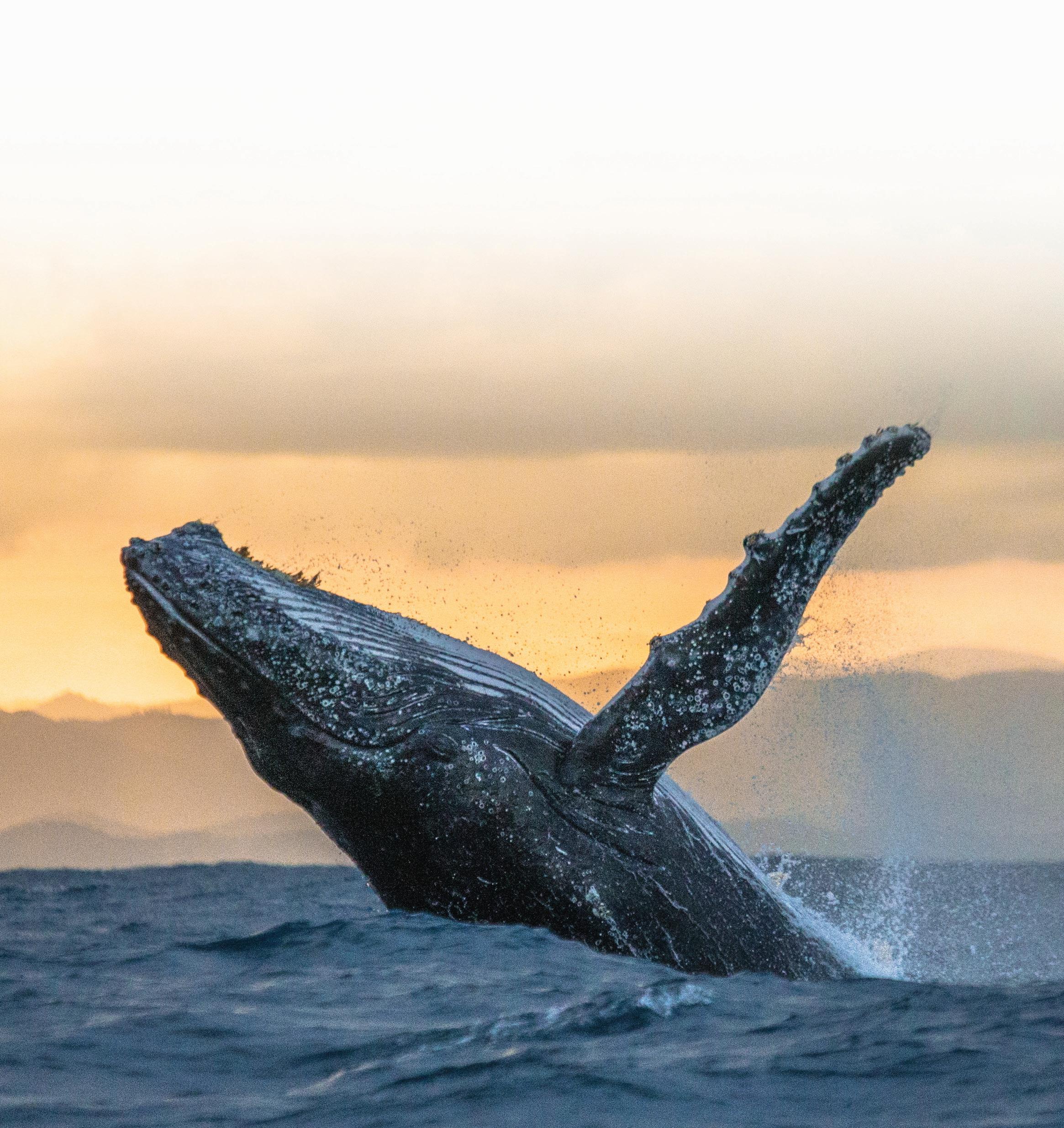ANIMAL WELFARE INSTITUTE





SEVENTY-FIRST
REPORT July 1, 2021 – June 30, 2022
Since 1951, the Animal Welfare Institute (AWI), a nonprofit charitable organization, has been alleviating suffering inflicted on animals by humans.
Through engagement with policymakers, scientists, industry, and the public, AWI seeks better treatment of animals in the laboratory, on the farm, in commerce, at home, and in the wild. Our work is focused on the following:
• Improving the housing and handling of animals in research, and encouraging the development and implementation of alternatives to experimentation on live animals
• Abolishing factory farms, supporting high-welfare family farms, and eliminating inhumane methods used to slaughter animals raised for food
• Preventing injury and death of animals caused by harsh transport conditions
• Ending the use of steel-jaw leghold traps and reforming other brutal methods of capturing and killing wildlife
• Preserving species threatened with extinction, and protecting wildlife from harmful exploitation and destruction of critical habitat
• Protecting companion animals from cruelty and violence, including suffering associated with inhumane conditions in the pet industry
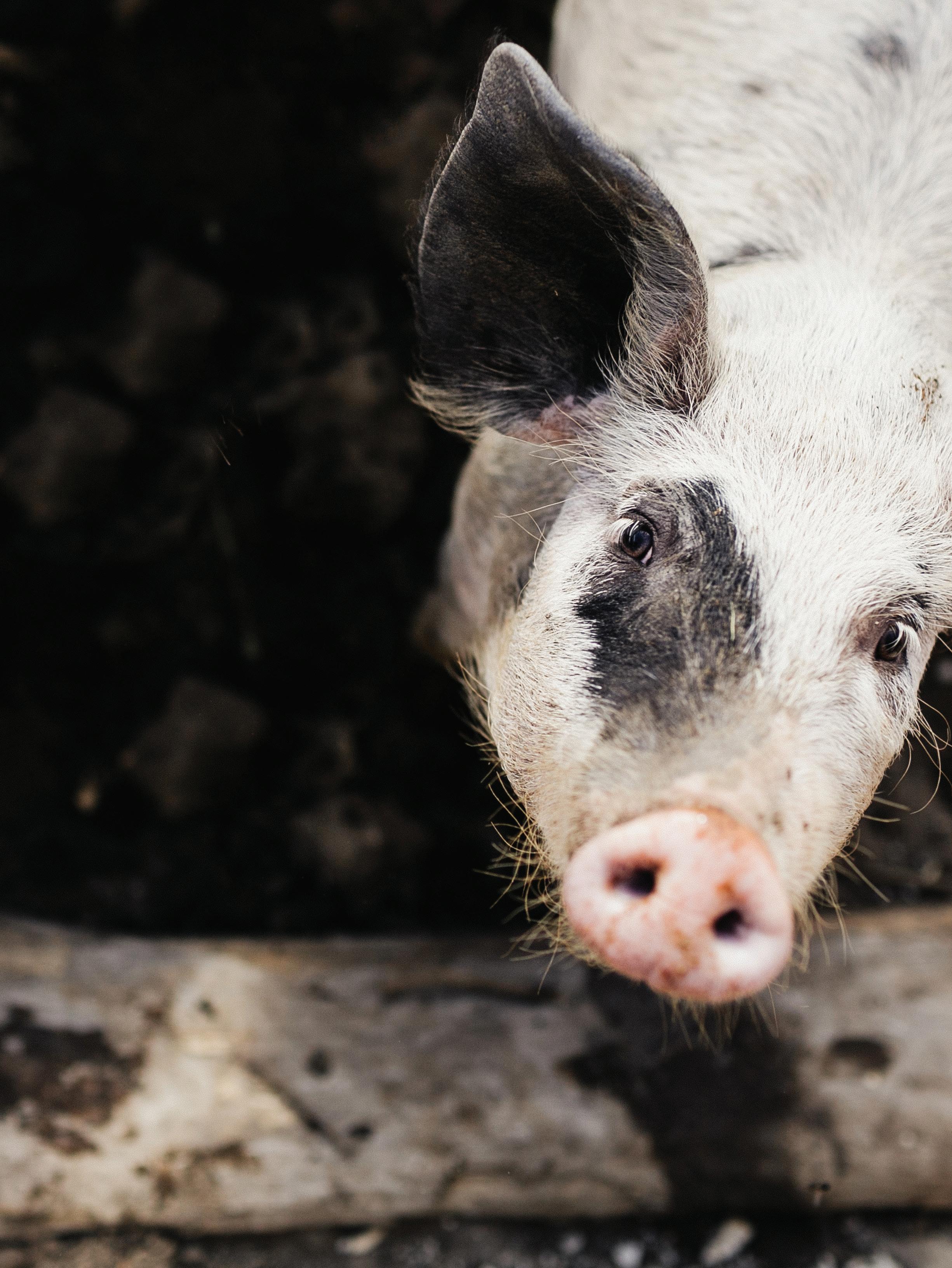
AWI encourages educators to teach about biological and ecological processes in a manner that instills a greater respect for animals and avoids methods that treat animals as disposable commodities.
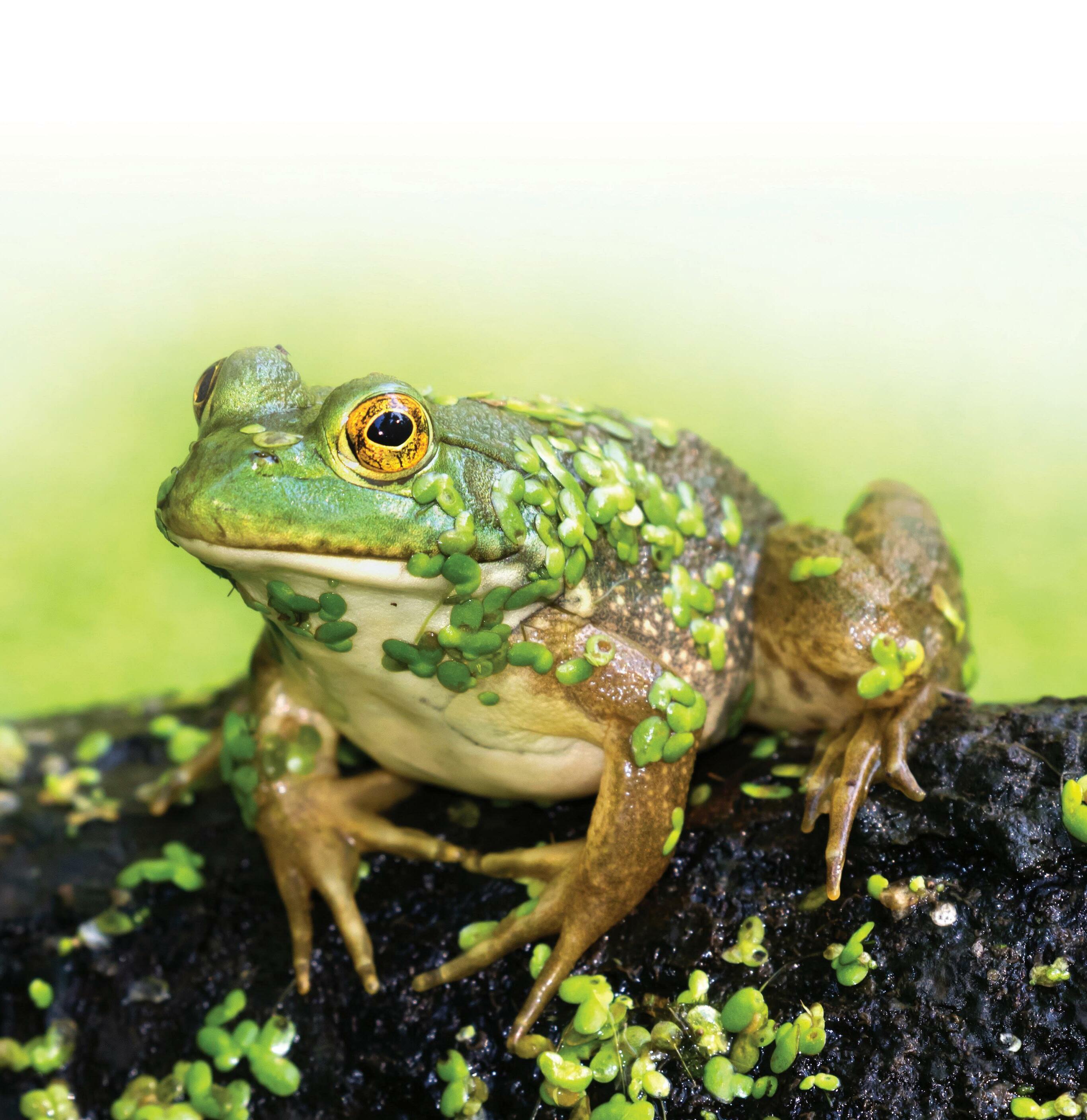
This year, AWI expanded the humane education resources we offer and made it easier for educators to access them. We have long provided our children’s books that teach kindness to animals free to teachers, along with accompanying lesson plans. We translated our lesson plans for the books Pablo Puppy’s Search for the Perfect Person and Kamie Cat’s Terrible Night into Spanish this year, and made these—along with
other AWI books and lesson plans—available for download on the Teachers Pay Teachers website.
We developed a lesson plan to educate middle school students about the harm to marine life caused by ocean noise from anthropogenic sources such as ship traffic, naval sonar, and oil and gas exploration. We look forward to adding new lesson plans to our collection in the near future. All of our lesson plans are created in coordination with teachers and designed to align with official learning standards to ensure they are grade appropriate and relevant in today’s classrooms.
We also provide our children’s books free to various nonprofit organizations around the country. Shelters and humane societies incorporate them into educational programs at their facilities and in local schools, while books donated to literacy organizations go directly into the hands of children in areas where resources are lacking. This year, we distributed over 17,000 English and Spanish language versions of our books to such organizations.
For decades, AWI has promoted animal-friendly science and the use of dissection alternatives in place of animals. In January 2022, we published an online state-by-state guide to laws pertaining to the treatment of animals in education. This list is a one-stop shop for anyone who wishes to learn how their state and others handle issues such as dissection choice and the teaching of humane treatment of animals.
In April 2022, AWI exhibited at the National Science Teachers’ Association conference in Houston, Texas, promoting dissection alternatives and distributing books directly to teachers. We also took this opportunity to survey biology teachers on whether the virtual learning methods employed during COVID had influenced their choice to use dissection alternatives such as computer software or smartphone apps once students and teachers returned to in-person learning. Among the respondents, 15 percent indicated that they had stopped using specimens during the pandemic and would likely not use them again. These results demonstrate an ongoing need for outreach, as well as support for schools considering a switch to alternatives, and will help shape AWI’s efforts on this issue going forward.
As in past years, we partnered with the Humane Education Network for the annual “A Voice for Animals” contest, which invites students age 14–18 to submit essays, videos, or photo essays that explore strategies to mitigate animal suffering. This year’s submissions came in from all over the world and covered a range of subjects, including rehabilitation of city pigeons injured by human trash, the high ecological cost of the medical industry’s continued extraction of horseshoe crab blood, and strategies to minimize negative impacts on wildlife from alternative energy generation.
In March 2022, we awarded 15 AWI Scholarships of $2,000 each to students entering college who are currently engaged in activities to advance animal welfare and who are pursuing degrees and future careers aimed at improving animal lives.
AWI seeks an end to cruel methods of housing, handling, transporting, and slaughtering farm animals. As an alternative to factory farming, we promote pasture-based farming systems that allow animals to express natural behaviors.
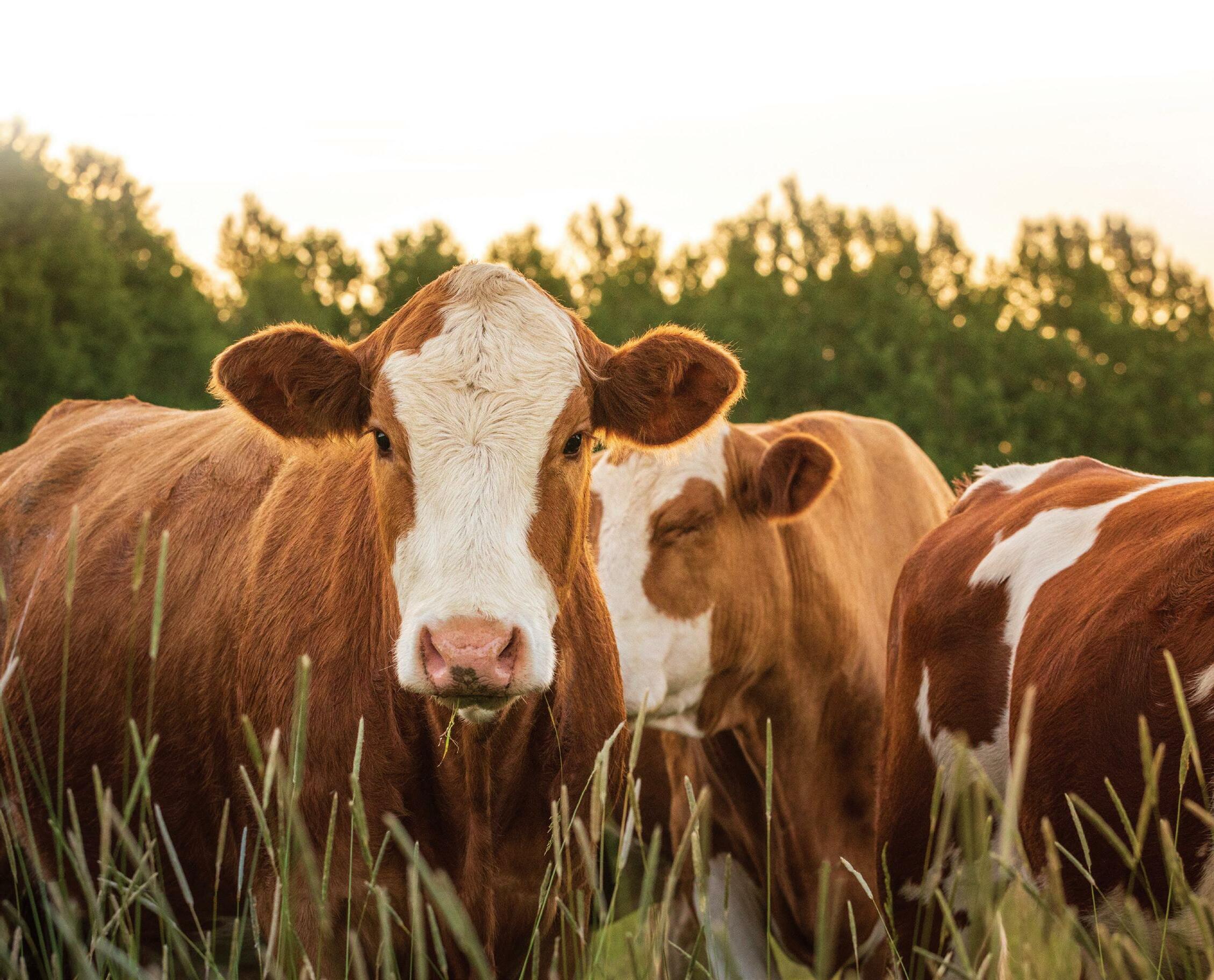
AWI launched a new campaign this year to call attention to the fact that most farm animals are denied pain relief for common surgical procedures, such as tail docking (partial amputation), horn removal, and castration. We commissioned a survey examining consumer attitudes toward these practices, published Legal Protections for Animals on Farms—a comprehensive report on the issue—and encouraged the American Veterinary Medical Association to strengthen its recommendations for pain relief during and
after painful procedures. We also urged the Ohio Livestock Care Standards Board to recommend that animal care regulations in that state be updated to reflect the current state of scientific knowledge regarding the need for pain relief for farm animals undergoing common surgical procedures.
In January, AWI published an updated version of its Barn Fires: A Deadly Threat to Farm Animals report covering US barn fires from 2018 through 2021. The report revealed that at least 3 million farm animals died in fires during this period. As part of our efforts to reduce the threat of barn fires, AWI has proposed two additional changes to the animal housing code of the National Fire Protection Association (NFPA). One would require farms of a certain size to install sprinklers or water storage tanks, and the other would require a fire detection system in areas of a barn where animals are housed. AWI is a member of the NFPA’s Technical Committee on Animal Housing Facilities, and this year’s proposals follow the NFPA’s adoption last year of two prior AWI code proposals.
For many years, AWI has reported on chronic enforcement issues regarding the federal TwentyEight Hour Law that imposes a 28-hour limit on how long farm animals (other than birds) can be transported without offloading them for food, water, and rest. This year we collaborated with another advocacy organization to uncover violations. We jointly filed a request to the US Department of Justice for investigation and possible prosecution in connection with a shipment of pigs from Nebraska to California that appears to have exceeded the limit.
AWI continues to urge agricultural officials in Hawaii to protect farm animals transported between the Hawaiian Islands by barge. We have worked with local animal advocates to propose revisions to the state’s animal health regulations and are awaiting a decision on the changes, which include measures to minimize heat stress these animals experience before and during sea journeys.
AWI has been pushing government officials to implement stronger policies related to the approval of animal-raising claims such as “humanely raised” and “free range” on food packaging. This year, the US Department of Agriculture informed AWI that it is undertaking a review of these claims as part of a commitment to increasing fairness and competition in agricultural markets. To inform this review, we continued work on a third edition of our report that highlights how the current process allows industrial producers to make deceptive, unsubstantiated claims. The upcoming edition will summarize problems identified through a review of USDA files pertaining to nearly 100 label claims.
AWI is continuing our efforts to ensure that the CARE Certified food-labeling program of Where Food Comes From, Inc., does not deceive consumers. We are urging improvements in its standards for pigs and reviewing its standards for dairy cattle. Having previously argued that its beef standards are inadequate and mislead consumers, we are considering legal options for challenging the CARE Certified label on beef and pork products.
AWI works around the globe to prevent inhumane and ecologically harmful commercial exploitation of marine species and destruction and degradation of their habitats.
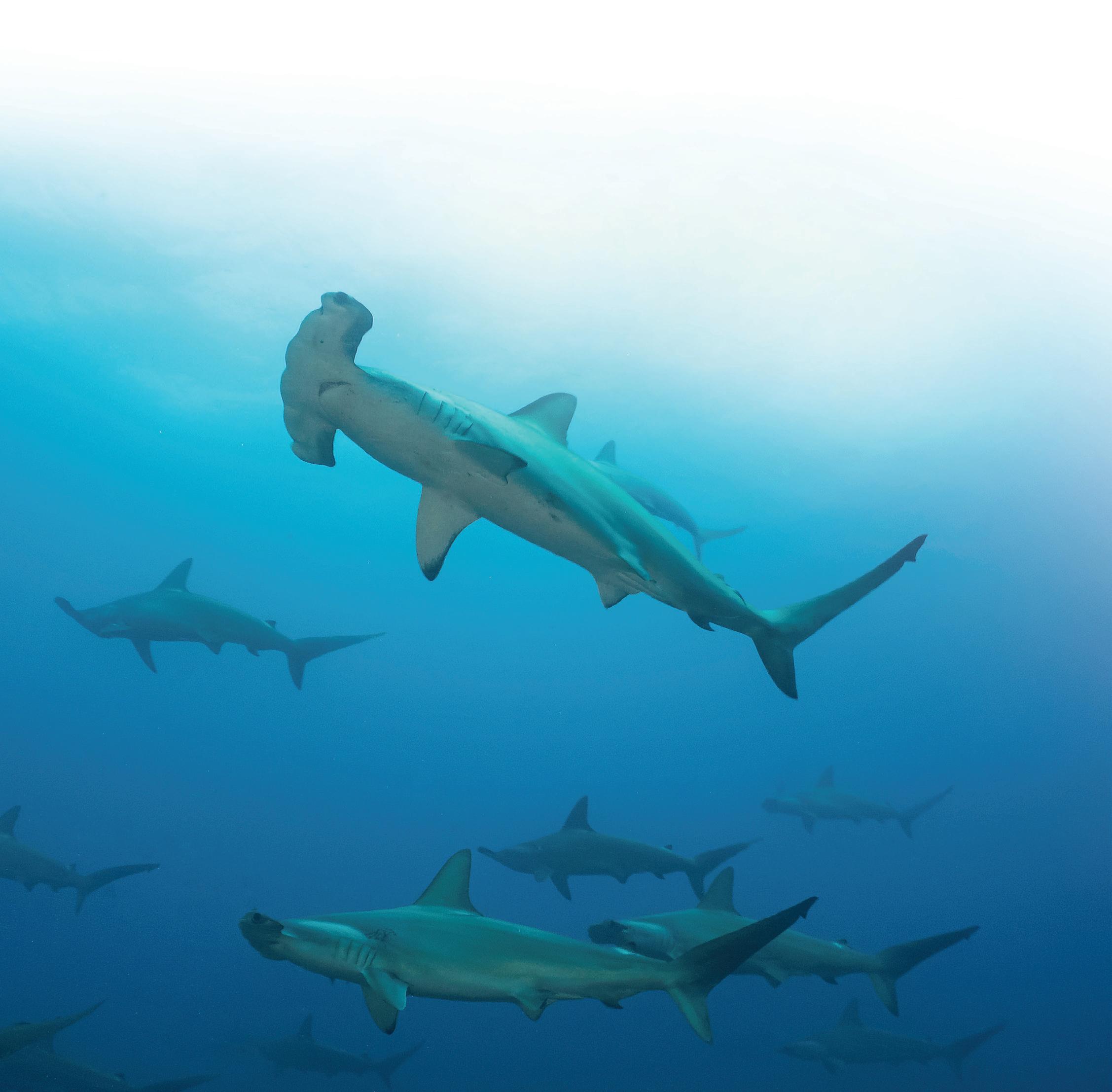
AWI and colleagues raised the alarm after two of the five captive-born belugas imported from Canada last year by Connecticut’s Mystic Aquarium died three and nine months after the import. Our review of documentation determined that these two young whales were subjected to a stressful transfer while suffering from preexisting health issues. AWI is urging the National Marine Fisheries Service, the Animal and Plant Health Inspection Service, and the US Fish and Wildlife
Service to strengthen the monitoring of animal health during wildlife border crossings to ensure such a rushed and reckless transfer is not allowed to happen again.
We continue to investigate grave welfare issues at the Miami Seaquarium, as well, where a 56-year-old orca, Tokitae (a.k.a. Lolita), has lived for decades in a small tank isolated from others of her kind. In September 2021, a damning USDA inspection report was released for the facility that revealed a performance-related injury to Tokitae, a number of marine mammal deaths, fights (some deadly) among incompatible tankmates, water quality issues, and animals (including Tokitae) being fed rotting fish. New Miami Seaquarium owners ended Tokitae’s exhibition and performances, and the Animal Welfare Act exhibitor’s license issued to the company explicitly omits Tokitae’s enclosure—without any assurance that the serious issues identified in the September inspection report had been addressed— raising deeply troubling legal questions concerning future federal oversight of her care and handling.
develop solutions to a serious budget shortfall caused by a number of governments falling behind on membership fees.
Following a 2021 request from AWI and partners, the US trade representative officially requested consultations with Mexico due to its failure to stop illegal fishing and protect the vaquita porpoise. This is the first time the US government has invoked this provision under the dispute mechanism of the United States-Mexico-Canada trade treaty, and it could lead to sanctions if Mexico does not take action.
Meanwhile, on Giving Tuesday in November 2021, AWI sponsored a successful fundraiser to finance the purchase of a vitally important workboat for a seaside sanctuary in Nova Scotia where whales retired from marine theme parks will live in spacious natural surroundings.
IN THE WILD AWI participated in a number of virtual meetings of International Whaling Commission committees this year in preparation for the IWC’s 68th meeting in October 2022. Prior to this meeting, AWI worked closely with like-minded countries and NGOs to
AWI’s Susan Millward and Kate O’Connell participated in several stakeholder workshops held by the Marine Stewardship Council (MSC) in connection with the development of the MSC’s latest Fisheries Standard, used to certify fisheries for the MSC ecolabel. AWI submitted extensive comments to MSC calling for a “fins naturally attached” (FNA) policy to combat the cruel and unsustainable practice of shark finning, whereby fins are sliced off live sharks aboard fishing vessels at sea and the mutilated bodies dumped overboard to make more room for the valuable fins. Our comments also addressed marine mammal bycatch deaths. A preliminary draft of the standard shows that, while an FNA policy and additional marine mammal protections are included, questions remain as to how MSC will ensure that these conditions are met. In June 2022, AWI and allies also formally objected to a recommendation by an industry-backed assessment body, MRAG, that MSC recertify the Gulf of Maine lobster fishery as sustainable. The lobster fishery poses a deadly entanglement risk to the critically endangered North Atlantic right whale. Our objection will be evaluated by an independent adjudicator.

AWI promotes strong enforcement of laws to protect companion animals. We develop resources to help law enforcement officials prosecute animal abusers and help social service agencies address the relationship between animal cruelty and family violence.
The war in Ukraine has created a horrific humanitarian crisis, and people around the world have lamented the devastation, bloodshed, and plight of refugees fleeing the country. AWI has partnered with animal welfare groups in and around Ukraine that are working to house, feed, and care for animals whose lives have been upended by the war. AWI has helped fund over a dozen organizations that run or support private and public shelters, veterinary clinics, zoos, and rescue and rehabilitation centers providing desperately needed food, supplies, and
medical care to animals trapped in the war zone and pets of refugees crossing the border. AWI established a fundraiser to allow us to expand this effort, and the very generous donations of those who answered our call provided a critical boost.
In October 2021, AWI published An Examination of Safe Haven Deserts: Identifying Areas that Lack Sheltering Services for Pets of Domestic Violence Survivors. This searchable online report details our research into the nationwide availability of safe havens—shelters that accommodate the pets of domestic violence survivors. It displays the number of safe havens per capita for every US county— thus exposing where gaps in coverage are most acute. Throughout the year, AWI funded efforts to strengthen and establish safe haven facilities.
Investigation on the nature of animal cruelty crimes was published in Criminal Justice Policy Review. AWI also made presentations on animal cruelty and its link to other crimes at a number of national and regional conferences and for webinars sponsored by the US Department of Justice and others.
A number of new states were added this year to our series of state-specific guides to help domestic violence survivors with pets seek inclusion of these animals in protection orders. The guides are designed to assist survivors and their advocates, with easy access to relevant forms and instructions, an overview of state law regarding inclusion of pets in protection orders, a summary of federal law pertaining to pets and protection orders, and suggestions for safety planning and gathering evidence for legal proceedings when pets are involved.
This year, an in-depth study conducted by Dr. Lynn Addington and AWI’s Dr. Mary Lou Randour that analyzed data collected by the Federal Bureau of
In September 2021, AWI held a full-day virtual workshop to help educate social service and humane law enforcement professionals in Ohio about a new law championed by AWI that expands crossreporting among law enforcement, veterinarians, and social service professionals of abuse involving animals or people to better protect both. AWI worked with the Ohio Department of Jobs and Family Services to develop core training modules and resources relating to HB 33, and we continued our training and strategic assistance in other states on the link between animal abuse and other crimes and how cross-reporting policies help with prevention and timely intervention in cases involving abuse.
AWI convened a stakeholder meeting with US Department of Agriculture officials and representatives from animal protection groups, the veterinary community, and the equine industry in June to press for the finalization of a rule to strengthen enforcement of the Horse Protection Act (HPA) to combat soring—the pervasive practice of injuring the legs and hooves of walking horses to exaggerate their gait for competitions. After the meeting, the administration released its spring regulatory agenda and signaled plans to publish the rule in the fall of 2022.
AWI seeks to reduce the detrimental impacts of human activities on wild animals. We work to strengthen national and international wildlife protection and foster humane, nonlethal solutions to conflicts with wildlife.
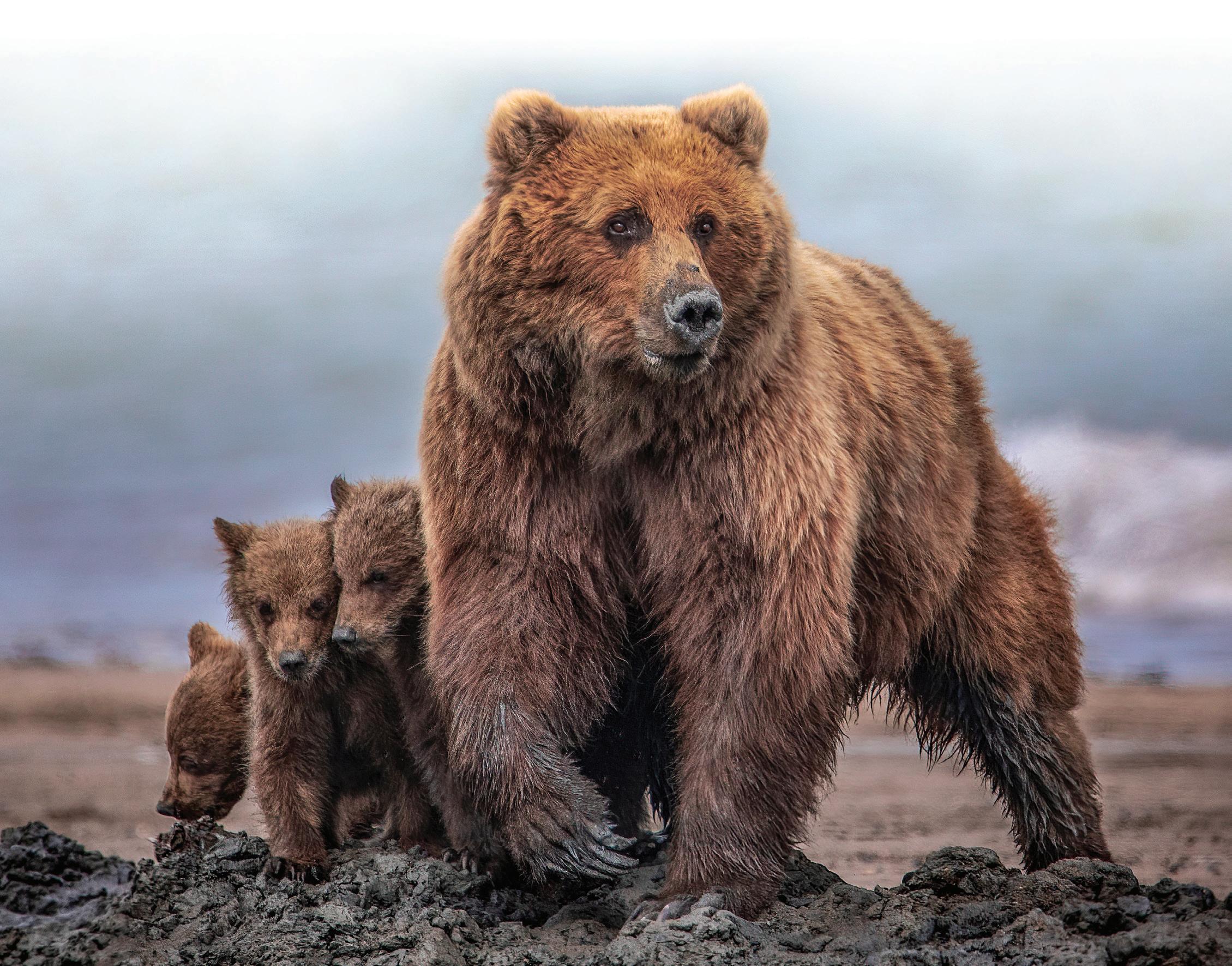
AWI met with dozens of congressional offices this year to build support for a federal grant program to help local governments, private landowners, and others protect property from beaver damage without harming beavers or disrupting their vital role in the ecosystem. More than 100 conservation groups, small businesses, and tribes, representing 33 states, joined an AWI-led letter supporting
this initiative. To illustrate the benefits of such a program, AWI funded numerous nonlethal beaver conflict-mitigation projects across the country.
AWI worked to promote human-bear coexistence in the Northern Rockies. In response to our advocacy, the City of Bozeman, Montana, launched a program to provide bear-resistant garbage bins in neighborhoods where black bear conflicts (and resulting bear deaths) are on the rise. AWI also helped purchase bearresistant bins for rural residents in high-priority areas in Montana and Wyoming, and funded the addition of hydraulic lids to rural dumpsters in an area of western Montana that represents important habitat for expanding grizzly bear populations.
Since our 2021 victory securing a preliminary injunction requiring the US Fish and Wildlife Service to release captive-raised red wolves into the Red Wolf Recovery Area in North Carolina, the USFWS has released over 15 wolves. In April, a litter of red wolf pups was born in the wild for the first time since 2018, and the agency has implemented other protective measures as part of a renewed dedication to the recovery program.
AWI is partnering with two organizations in an ambitious project to save critically endangered Hawaiian honeycreepers from extinction. The birds are rapidly dying from avian malaria spread by non-native mosquitos. Climate change is allowing mosquitos to spread into the birds’ remaining high-altitude refuges, and could wipe out several species within the next couple of years if unchecked. To combat this, AWI is supporting implementation
of innovative strategies to inhibit mosquito reproduction through nontoxic means, as well as public outreach and education efforts.
WILDLIFE TRADE
AWI participated in the 74th meeting of the Standing Committee of the Convention on International Trade in Endangered Species of Wild Fauna and Flora (CITES) in Lyon, France, where decisions were made on wildlife trade issues in preparation for the 19th meeting of the Conference of the Parties in November 2022 in Panama. AWI also participated in CITES working groups established to address the role of wildlife trade in spreading zoonotic diseases, combatting the illegal totoaba trade, and ensuring that captive breeding of CITES-listed wildlife complies with the treaty.
Our campaign to phase out cruel, dangerous mink fur farming continued. We urged the US Department of Agriculture to better prevent outbreaks of COVID-19 on mink farms and petitioned the USFWS to list captive mink as an “injurious species” under the Lacey Act, which would limit importation and interstate transport of mink and mink products.
In June 2022, AWI filed a protest against the Bureau of Land Management’s plan to eliminate over 2 million acres of habitat for wild horses in the Wyoming Checkerboard region. The plan comes after the largest roundup in US history, in which the agency removed over 3,500 horses from the Checkerboard over the winter. AWI co-organized a petition to Interior Secretary Deb Haaland signed by over 70,000 Americans opposing the roundup and delivered it during a rally in Washington, DC.
AWI fosters species-appropriate housing, compassionate care and handling, and minimization of fear, distress, and pain for animals in research. We promote research methods that reduce the total number of animals subject to experimentation.
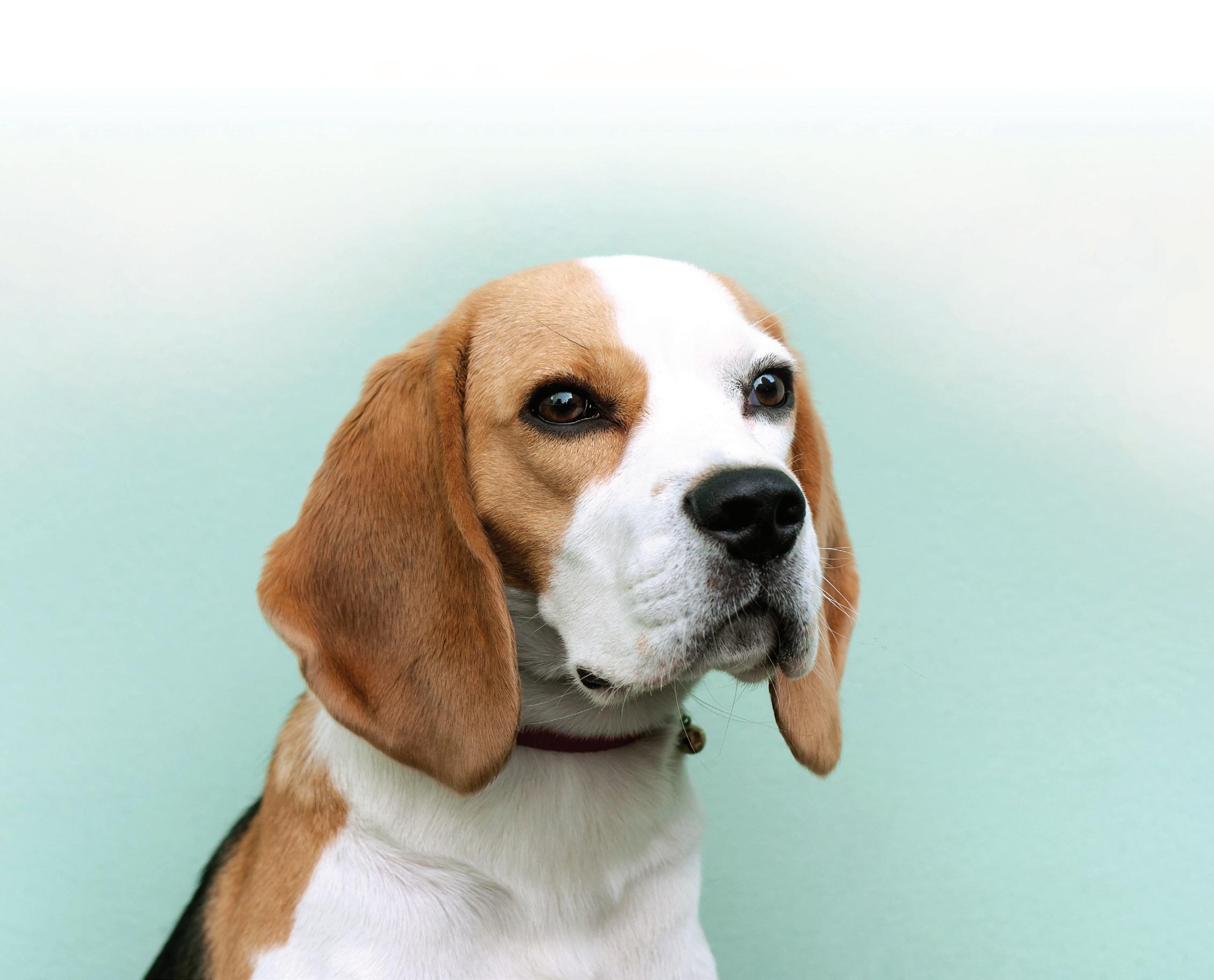
In October 2021, AWI hosted a virtual exhibit for the American Association for Laboratory Animal Science National Meeting. The exhibit featured AWI’s many materials on refinement (methods to reduce pain, distress, and longterm harm) in the care and handling of animals in research, making these available to conference attendees from academia, industry, and government. In February, Dr. Joanna Makowska represented AWI and the interests of animals in
research during an expert panel discussion hosted by the Campbell Centre for the Study of Animal Welfare on “animal welfare scientists’ attitudes across species and industries.” That same month, Joanna presented a webinar on high-welfare standards in the laboratory for rats and mice (which represent the vast majority of animals in research) hosted by the Animal Protection Commissioner of Berlin and the Johns Hopkins Center for Alternatives to Animal Testing, in collaboration with the Veterinary Chamber of Berlin.
AWI Refinement Grants support innovative research projects aimed at improving the welfare of animals in research. This year, AWI awarded grants to four worthy recipients: Dr. Becca Franks (New York University) for a study investigating play in fish and whether it can be used as a welfare indicator; Alexander Greig (Texas Biomedical Research Institute) to assess the potential of visual barriers to reduce social stress in the housing of captive marmosets; Dr. Julie Menard (University of Calgary) for testing a noninvasive alternative to endoscopy when sampling the small intestine microbiome in dogs; and Drs. Cathy
Schuppli and Amelia MacRae (University of British Columbia) for developing positive reinforcement and counterconditioning training protocols for laboratoryhoused mice and pigs to improve human-animal interactions in a research setting.
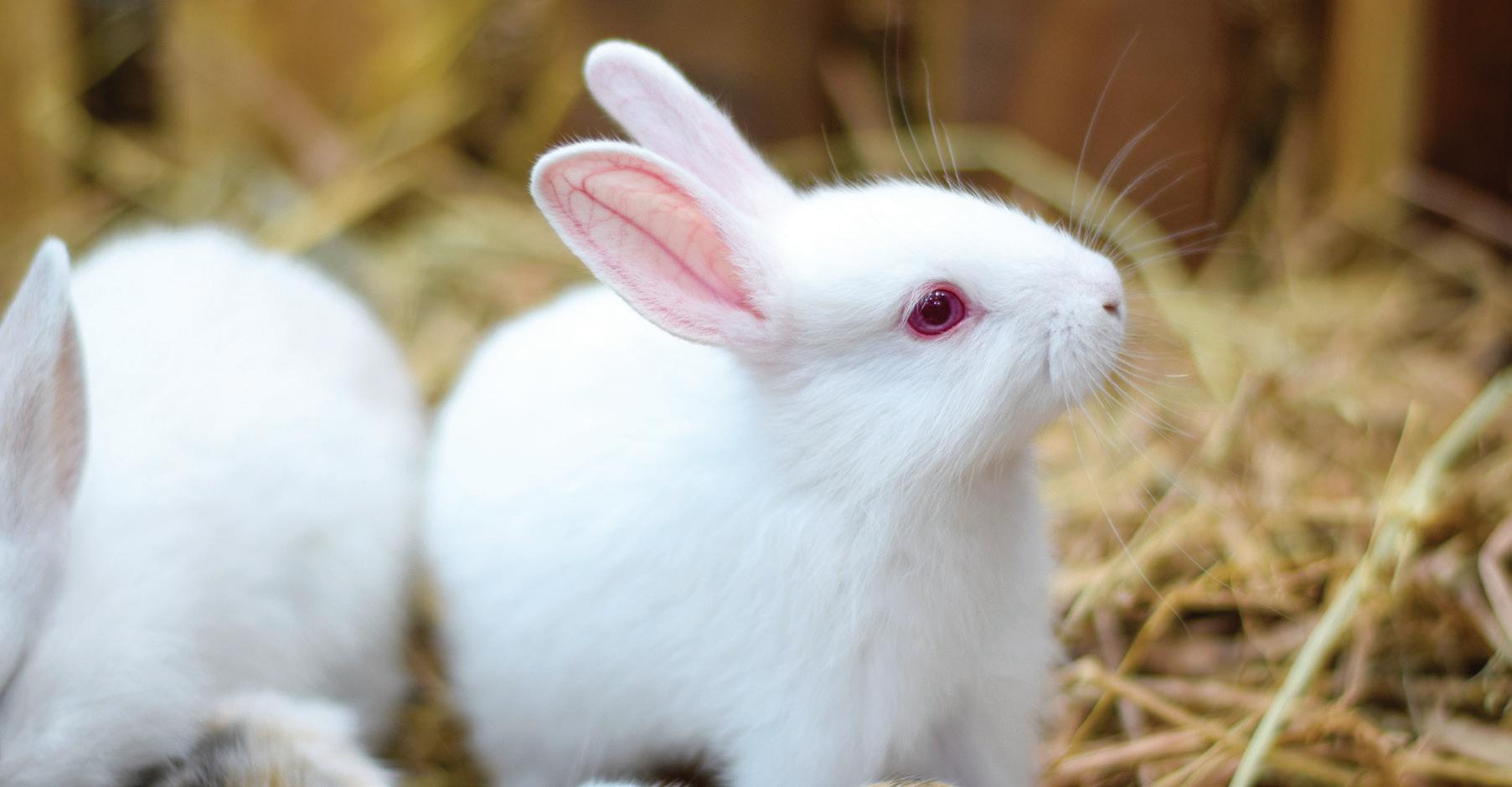
AWI’s Animals in Laboratories program provides numerous resources to laboratory animal personnel to facilitate the exchange and dissemination of information about high-welfare standards for research animals. This past year, AWI continued to host the Laboratory Animal Refinement and Enrichment Forum (LAREF), where animal technicians, animal care personnel, researchers, veterinarians, and students shared their experiences and exchanged information about best animal care practices. Topics of conversation included caretakers’ relationships with nonhuman primates in research, mouse handling methods, and tips to reduce fear in rabbits in laboratory research. AWI has also continued to regularly update its Refinement Database, which curates published scientific articles and books on topics related to the refinement of housing, husbandry, and care of animals in research.
AWI research into animal abuse at animal dealers, laboratories, and other entities licensed and/or registered under the Animal Welfare Act (AWA) contributed to 10 highly visible and influential articles published this year by National Geographic and the journal Science. The information AWI provided these publications about the US Department of Agriculture’s AWA enforcement failures, including specific examples of animal suffering at regulated entities, reached tens of millions of readers among the public, researchers, law enforcement, and legislators. We also continued to expose chronic abusers and USDA inaction in our own AWI Quarterly magazine.
In July 2021, AWI research contributed to searing exposés in National Geographic and Science of long-standing animal abuse at Moulton Chinchilla Ranch, one of the few remaining US suppliers of chinchillas for research. As both publications would later report, owner Daniel Moulton finally had his license permanently revoked in October. The judge who ruled on the case called Moulton’s 213 “willful” AWA violations “absolutely astounding.” Moulton and Ryerson Chinchilla, two of the top three suppliers of chinchillas for research, are now out of business after information from AWI helped expose their abuse.
National Geographic repeatedly quoted AWI in an in-depth piece in October 2021 that detailed how the USDA prioritized business interests over animal welfare in its enforcement decisions. This article cited a number of egregious examples, including the first national reporting of what AWI called the “hellscape”
of notorious dog breeder Daniel Gingerich, whose license was permanently revoked that same month.
AWI provided information to Science for its November 2021 report on dozens of serious AWA citations at an Envigo facility in Virginia that was one of the major sources of beagles for research. National Geographic also published an article on Envigo in May 2022, extensively quoting AWI in detailing the USDA’s lack of enforcement action against the company even after numerous inspections over many months documented horrific conditions that should have prompted immediate confiscation. The US Department of Justice and the Commonwealth of Virginia eventually stepped in to fill the void, seizing 446 dogs deemed by veterinarians to be in “acute distress.” Subsequently, Envigo entered a settlement in which it agreed to shutter the facility and surrender approximately 4,000 dogs for adoption. In May and June, Science published additional pieces on Envigo and its parent company, Inotiv, in which AWI raised questions over the welfare of tens of thousands of other animals under Inotiv’s control.
National Geographic also repeatedly quoted AWI in a June 2022 piece about the suffering and neglect endured by chimpanzees who were used in research. The article, featuring moving photos of the animals, describes how the National Institutes of Health devoted significant resources to ensure a steady supply of chimps for experimentation, yet failed miserably in providing for their retirement to sanctuaries once the research ended.
AWI has been a leader, at both federal and state levels, in securing landmark laws aimed at shielding animals from cruelty and needless suffering. We work to ensure diligent enforcement of these laws and fight efforts to roll back hardwon animal protections.
The final fiscal year 2022 federal spending bill—which wasn’t finalized until March 2022, well into the fiscal year—contained a significant number of animal welfare provisions championed by AWI.
AWI led a successful campaign to secure unprecedented financial support in the bill for implementation of humane fertility control methods to manage wild horse populations. While AWI disputes the government’s methods and motivations for determining what constitutes “too many” wild horses on the range, we support the use of
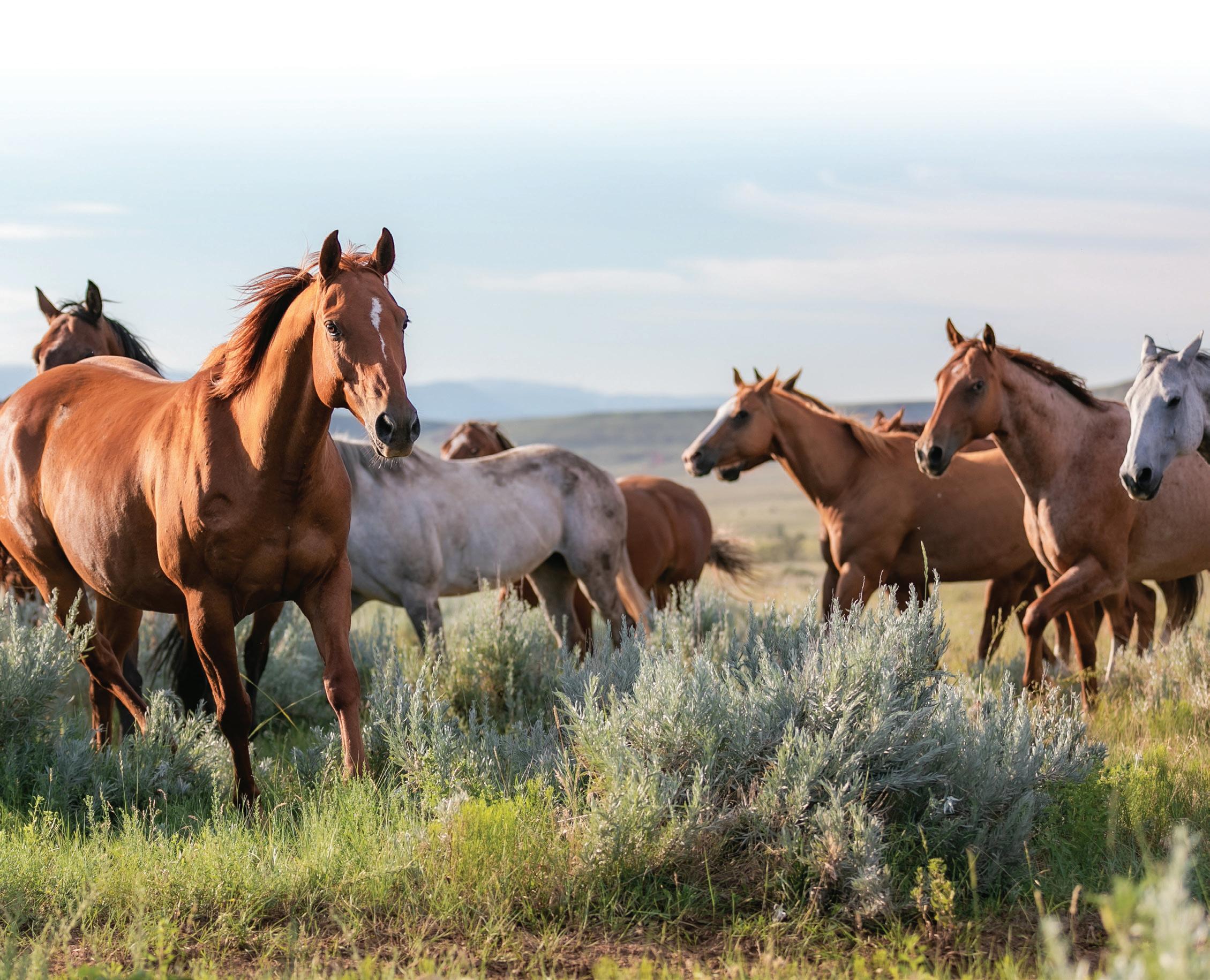
safe, effective immunocontraceptives to manage populations in a humane manner that leaves family bands together within their natural habitat. Currently, the Bureau of Land Management subjects these wild equines to a never-ending series of brutal and terrifying roundups to reduce their numbers in the wild, leaving some horses mortally wounded and the rest facing a lifetime of captivity in holding pens.
The bill strongly affirmed AWI efforts to expose the US Department of Agriculture’s anemic enforcement of the Animal Welfare Act (AWA). In the media and on Capitol Hill, AWI has sounded the alarm over egregious animal suffering at regulated facilities while the USDA looks the other way. Congress used the bill to echo our calls for reform, sharply admonishing the USDA for its “ongoing mismanagement” with respect to AWA enforcement and signaling Congress’s intent to monitor the department’s fulfillment of its responsibilities going forward.
Detection Canine Program. As in prior years, Congress included measures in the bill to block the resumption of horse slaughter in the United States, the slaughter of wild horses and burros abroad, and the licensing of dealers who acquire dogs and cats from random sources to sell for experimentation.
The spending bill boosted funding for research and conservation efforts aimed at saving the critically endangered North Atlantic right whale, with muchneeded support for a pilot program that seeks to develop, refine, and test innovative fishing gear to reduce entanglements—a major cause of whale deaths in the region. The bill also increased funding for Horse Protection Act enforcement and for grants to create or expand programs to help domestic violence survivors and their pets find safety. It funded fact-finding efforts to help address a number of animal welfare issues, including humane slaughter, trophy hunting, trapping on public lands, farm animal disaster preparedness, and the mistreatment of dogs sent overseas under the government’s Explosive
A number of AWI’s priority bills received significant attention during the year, passing important milestones in the journey toward passage. Four such bills received hearings in House committees: the Prohibit Wildlife Killing Contests Act, to ban wildlife killing contests on public lands; the Captive Primate Safety Act, to prohibit interstate or foreign commerce in nonhuman primates for the exotic pet trade; the Marine Mammal Research and Response Act, to rescue and rehabilitate sick and injured marine mammals and determine the causes of their distress; and the Big Cat Public Safety Act (BCPSA), to prohibit the private possession of lions, tigers, and other big cats. The BCPSA was subsequently approved by the House Natural Resources Committee—and in a major win after the end of the fiscal year, it passed the full House of Representatives.
Another priority bill, the Driftnet Modernization and Bycatch Reduction Act, to phase out deadly large mesh drift gillnets in federal waters, passed the Senate as a standalone bill in September 2021 and was included in the version of the America COMPETES Act that passed the House in February. (The standalone bill passed both chambers the previous Congress, but was vetoed by President Trump in his final month in office.) Other measures AWI helped get included in the House-passed
version of the America COMPETES Act: the Marine Mammal Research and Response Act (described above); the Shark Fin Sales Elimination Act, to prohibit the sale, purchase, and possession of shark fins in the United States; and the Illegal Fishing and Forced Labor Prevention Act, to combat illegal and unregulated fishing. The bill also contained elements of the Preventing Future Pandemics Act, to outlaw the import, export, and sale of live wildlife for human consumption, as well as other provisions taking aim at wildlife trafficking.
AWI helped get a number of other priority bills introduced or reintroduced, including the Right Whale Coexistence Act, to fund solutions that allow the fishing industry and vessels to safely share the ocean with right whales; Canyon’s Law, to outlaw the use of M-44 cyanide devices on public lands; the Pet Safety and Protection Act, to prohibit the sale of random source dogs and cats to laboratories; the Animal Welfare Enforcement Improvement Act, to strengthen AWA licensing and enforcement; the Public Safety and Wildlife Protection Act, to prohibit interstate shipment of steel-jaw leghold and Conibear traps; and the Refuge from Cruel Trapping Act, to ban the use of body-gripping traps on national wildlife refuges.
AWI legislative activity outside Washington, DC, paid dividends this year with enactment of three important AWI-supported state bills:
operations—which stress the animals and fuel an endless cycle of breeding—will no longer be allowed in Indiana.
That same month, Utah joined the nationwide effort to provide greater protection to companion animals of domestic violence survivors when HB 175 was enacted to authorize the inclusion of pets on personal protection orders. This makes Utah the 37th state, along with the District of Columbia and Puerto Rico, to recognize that pets can also become victims of domestic violence.
In March, Indiana bill HB 1248 was signed into law, prohibiting public contact with lions, tigers, leopards, snow leopards, jaguars, cougars, big cat hybrids, and bears. Exploitative activities such as cub petting
And in Maryland in April, a blow was struck against exploitation and trafficking of wildlife when HB 52/ SB 381 was signed into law, restricting the sale of parts and products from elephants, rhinos, tigers, giraffes, sea turtles, and other imperiled species.
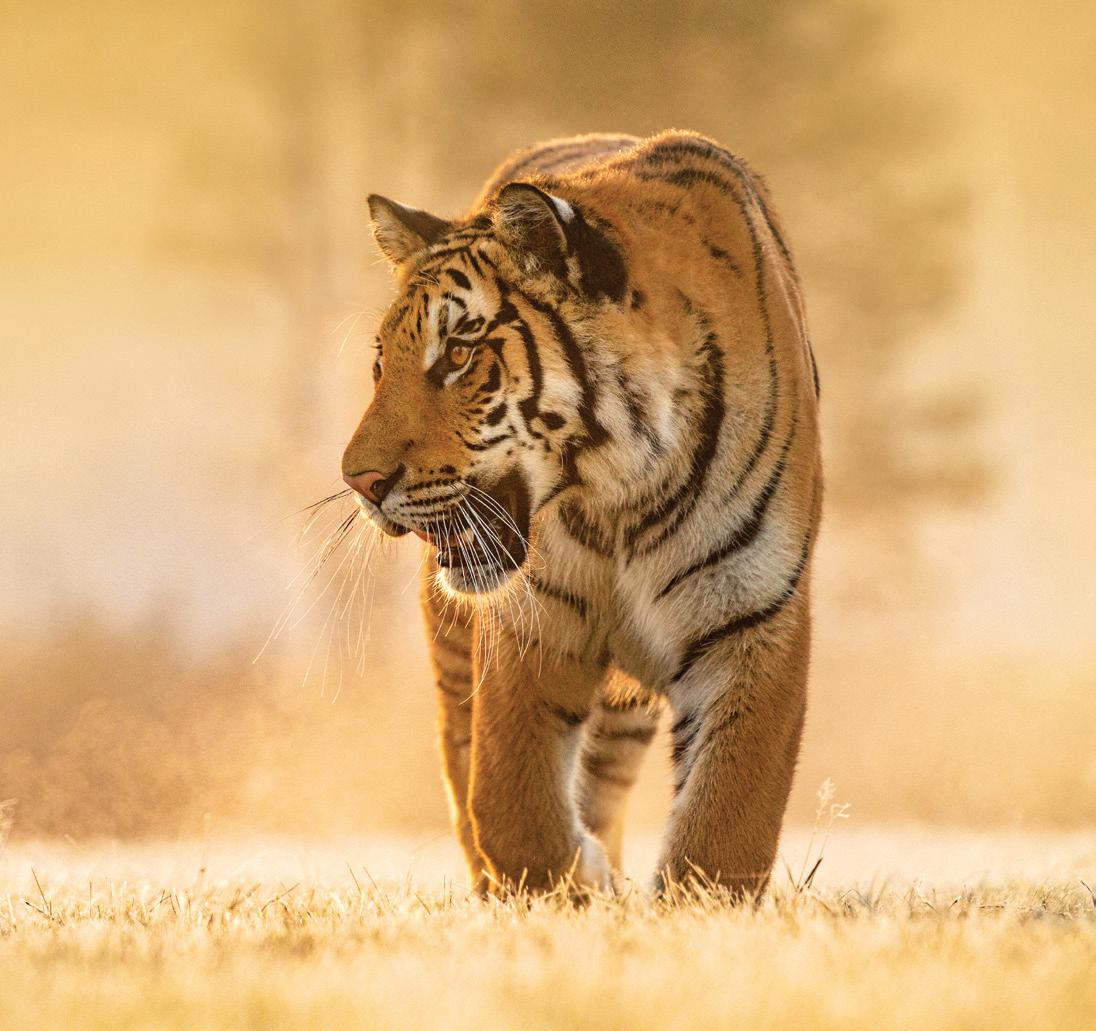
The AWI Quarterly magazine is distributed to 60,000 individuals and organizations, including public libraries, veterinarians, laboratory personnel, scientists, farmers, teachers, law enforcement officers, shelters, animal protection organizations, members of Congress, and AWI members. The following are summaries of some of the articles featured in the magazine this fiscal year.

VOLUME 70, NUMBER 3
In 2020, AWI and allies sued the US Department of Agriculture for failing to regulate the treatment of nonambulatory, downed (NAD) pigs. The USDA’s inaction follows an earlier failure to respond to an order from Congress to investigate and report on the humane treatment of nonambulatory livestock. At slaughterhouses, NAD pigs often suffer inhumane handling, as workers prod, kick, and drag them to force them to move. In June 2021, a federal court denied the USDA’s motion to dismiss our case, which now moves forward.
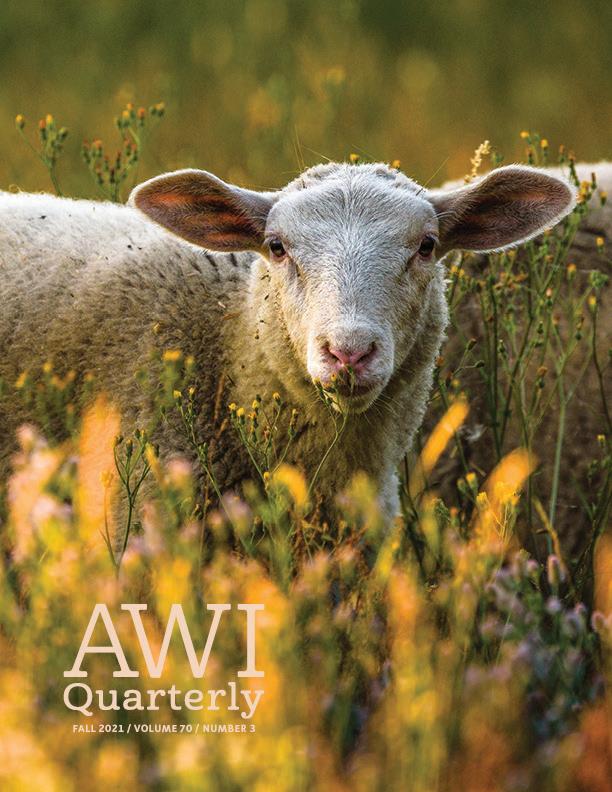
Jeff and Lauren Lowe, who took over the infamous Tiger King zoo from Joe Exotic, surrendered their exhibitor license in 2020 after USDA inspectors found horrible animal suffering at their facility. In January 2021, a court ordered them to stop exhibiting in defiance of the law. Four months later, they were found in contempt, and the government seized 68 big cats from the couple. In June, the US Department of Justice filed a new complaint, noting their continued defiance and recommending jail time unless the couple surrendered the remainder of their animals.
A USDA Office of Inspector General (OIG) report excoriated the USDA’s Animal Care (AC) program for shoddy recordkeeping that impeded its ability to respond to or resolve complaints—or even keep track of its own efforts to do so. “Some dog breeder facilities may be conducting regulated activities without a USDA license or oversight,” according to the report; as a result, the USDA “is not able to ensure the overall health and humane treatment of animals at these facilities.” The OIG admonished AC to fix these issues as it implements a new recordkeeping system.
With support from AWI and other organizations, a joint International Whaling Commission/Convention on the Conservation of Migratory Species virtual workshop was held in the spring to identify and prioritize research to advance our understanding of how whales contribute to ecosystem functioning. Experts from around the world discussed whales’ significant contribution to carbon sequestration and their critical role in cycling the nutrients that underpin the entire marine food web. The more we learn, the clearer it becomes that our own vital interests are served by protection of whales.
A recent discussion on AWI’s Laboratory Animal Refinement and Enrichment Forum (LAREF) focused on ways to provide pigs in research with durable materials with which to scratch themselves. Pigs love to scratch, according to one LAREF participant, but it is “tough to find something they can’t destroy; they are masters at destruction!” Drawing on the caretakers’ own experiences, a number of scratching methods were weighed, from mounted broom heads and floor buffer pads to mechanical scratchers that rotate when animals touch them.
In May 2021, the New York Times published an investigation into the Bureau of Land Management’s Adoption Incentive Program, which pays individuals to adopt wild horses. Unscrupulous “adopters,” however, have been turning around and selling the horses to slaughter abroad. Shortly after the exposé broke, AWI worked with lawmakers in Congress to call for a formal audit and suspension of the program. AWI also delivered remarks on the need for reforms during the BLM’s National Wild Horse and Burro Advisory Board meeting. The following month, the BLM announced the launch of an internal investigation.
VOLUME 70, NUMBER 4
Each year, hundreds of thousands of horseshoe crabs are captured and partially drained of their vivid blue blood, which is used to detect the presence of endotoxins in vaccines and other medical substances and devices injected or implanted in humans. The weakened animals are returned to the ocean, but many don’t survive. An effective, animal-free endotoxin test has been available commercially since 2004, but regulatory hurdles—as well as opposition from biomedical industry heavyweight Charles River Laboratories, which manufactures the test derived from blood—have thwarted widespread US adoption of the synthetic alternative.
In September 2021, the US Department of Justice filed a complaint against Iowa dog breeder Daniel Gingerich, after USDA inspectors documented deplorable conditions on his premises over many months. This resulted in an injunction against Gingerich, a first against a breeder licensed under the Animal Welfare Act. In the end, he was forced to surrender over 500 dogs, and the USDA permanently revoked his license. This welcome outcome,
however, does not excuse the USDA’s failure to take urgent action to rescue the suffering dogs long before the DOJ was obliged to step in.
Dr. Sam Wasser’s forensic work led to the November 2021 arrest of two Congolese men for conspiring to bring more than two tons of ivory, a ton of pangolin scales, and multiple white rhino horns into the United States. Wasser and his team at the University of Washington use a DNA database he developed to determine the origin of seized ivory—work that helps law enforcement officials link individual smugglers to specific ivory shipments. In 2018, AWI awarded Wasser the Schweitzer Medal in recognition of his pioneering efforts to thwart wildlife trafficking.
In April 2021, the USDA badly bungled the first Horse Protection Act (HPA) complaint it had filed in 14 months (and only the second in four years) by including incidents resolved by a prior settlement with the accused, David Latham. Rather than refiling based solely on fresh allegations against Latham, the USDA chose instead to withdraw the complaint altogether, telling the judge it was doing so because it had “determined that it is not necessary to pursue this matter at this time in order to effectuate the purposes” of the HPA.
AWI is urging the American Veterinary Medical Association to revise its guidelines to no longer permit killing animals using ventilation shutdown plus (VSD+)—in which operators seal barns, turn off the airflow, and raise the temperature to induce heat stroke. The process can take hours and cause extreme distress. When slaughter plants closed during the COVID-19 pandemic, VSD+ was used to kill and dispose of at least a quarter of a million healthy pigs who posed no risk to public health.
This year, nine research projects were selected to receive grants of up to $15,000 each through AWI’s Christine Stevens Wildlife Awards. This grant program, named for AWI’s founder, funds innovative strategies for humane, nonlethal wildlife-human conflict management and study. Projects funded included studies involving Antillean manatees, box turtles, gray wolves, threatened eastern black rails, red-tailed hawks, American pikas, and the endangered salt marsh harvest mouse.
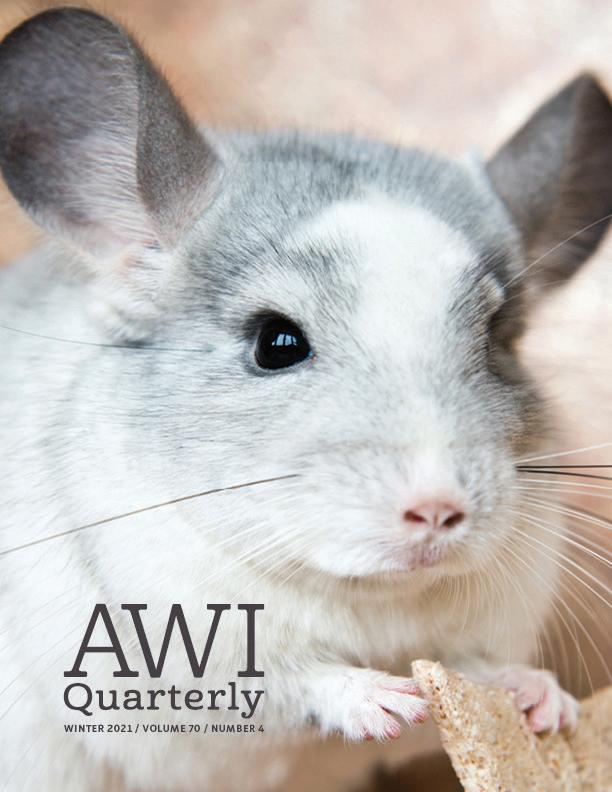
VOLUME 71, NUMBER 1
Human and animal abuse are intertwined, says Not Without My Pet author Andrew Campbell, yet pets are often left out of family violence prevention, detection, and intervention initiatives—including the provision of shelter. Pets can be an emotional lifeline, and victims may choose to stay in abusive situations rather than leave animals behind to face the danger alone. Campbell warns that “communities cannot best protect humans from abuse unless they include the animals connected to them in the process.”
A meta-analysis published in the journal BMC Biology compared the health of rats and mice in enriched environments vs. conventional (barren) laboratory cages. The study—focusing on maladies exacerbated by chronic psychological stress in humans—found that conventionally housed rodents have shorter lifespans, increased risk of cardiovascular disease, greater cancer and stroke severity, and more signs of anxiety and depression. Widespread use of chronically stressed animals in research is alarming from a welfare perspective and raises questions about the reliability of the data generated.
Australia’s catastrophic 2019–2020 wildfires killed or displaced nearly 3 billion animals. Southern Cross Wildlife Care, a wildlife hospital and rehabilitation center in New South Wales, has taken in a number of young wombats orphaned by the fires and is dedicated to their long-term care. To help these animals recreate and rehabilitate, AWI funded construction of a secure outdoor enclosure at the facility—where the youngsters can explore, run through tunnels, dig, and hopefully recover from the terrible trauma.
Senator Robert Dole (R-KS), who died in December 2021, was a champion for animals in Congress. He was instrumental in the 1966 passage of the Animal Welfare Act (AWA) and the 1970 amendment to strengthen and expand AWA coverage. A crowning achievement in 1985 prompted AWI to award him the Schweitzer Medal: That year, Dole secured the Improved Standards for Laboratory Animals amendment to the AWA. This established institutional oversight committees for research facilities and mandated exercise for dogs, living environments that support psychological well-being for primates, and minimization of pain and distress and alternatives to painful procedures for animals in research.
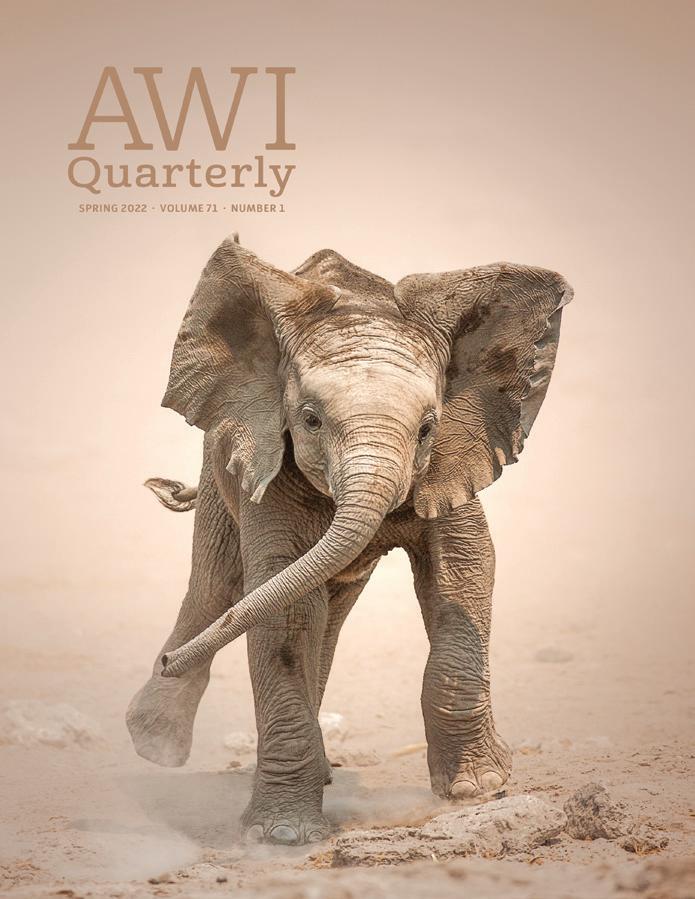
Highly pathogenic avian influenza returned to the United States in 2022, and tens of millions of domestic poultry have been killed to stop the spread of the disease. In some locations, more than a million birds may have been culled— an intensity of production that makes it difficult, if not impossible, to kill the animals humanely and quickly. AWI is urging the government and the poultry industry to use the least inhumane killing methods possible and to take steps to reduce the exposure of US commercial flocks to the virus.
After 20 years, two lawsuits, and prodding from Congress, the USDA has finally proposed regulations to extend Animal Welfare Act protections to birds (excepting those bred for use in research). The regulations would impose minimum care standards and oversight with respect to bird exhibitors and entities that breed birds for the pet trade. AWI’s comments endorsed the provisions but noted an additional need to require accommodations for flight, restrict public contact, and prohibit the use of tethering as a primary means of containment, as well as regulate pet stores that sell birds.
VOLUME 71, NUMBER 2
In July 1982, members of the International Whaling Commission agreed to a global ban on commercial whaling. The ban, which took effect in 1986, is widely acknowledged as one of the most significant conservation victories of all time. AWI, a leader of the Save the Whales movement of the 1960s and 1970s, was instrumental in securing the ban. To celebrate the decision’s 40th anniversary and call attention to the human-caused threats cetaceans still face, AWI cohosted an event this summer with other NGOs and the UK government at the Brighton, England, hotel where the agreement was reached.
Standards are being raised for some animals in agriculture through state legislation, ballot initiatives, and corporate commitments. Unfortunately, industrial agriculture still balks at voluntary improvements to its animal care practices, leaving most farm animals suffering under deplorable conditions. AWI’s A Consumer’s Guide to Food Labels and Animal Welfare helps consumers choose higher-welfare alternatives and avoid deceptive claims, and we are urging passage of the Farm System Reform Act to phase out the
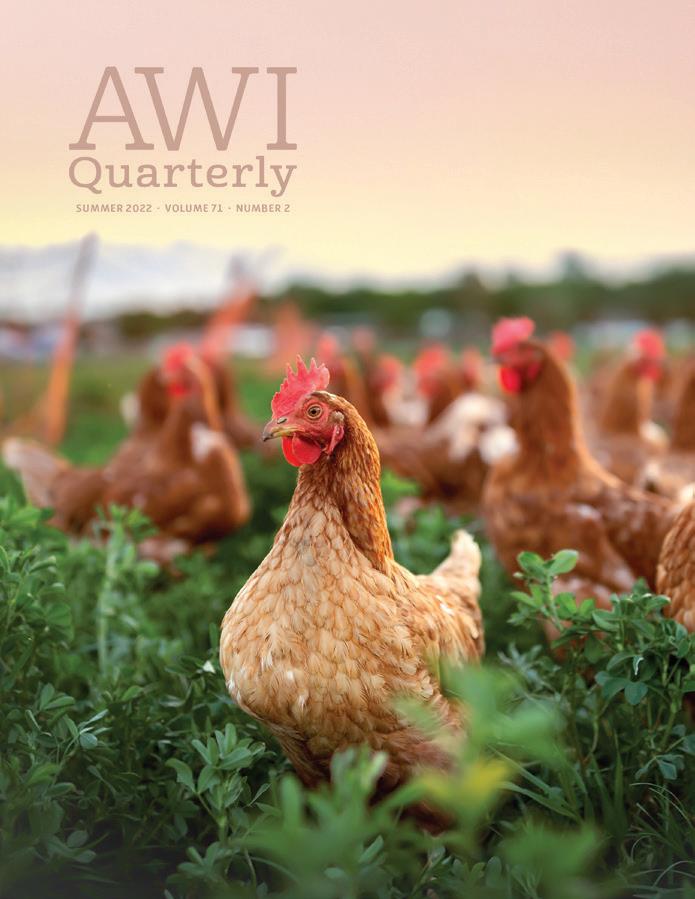
largest factory farms and assist farmers seeking to transition to higher-welfare farming or crop production.
Japanese quail maintained in barren research environments exhibit high-stress behaviors, reduced immunocompetence, and increased injury and mortality. A study funded by an AWI Refinement Grant investigated the impacts of six environmental enrichments for colony-housed quail—three protective (acrylic hut, natural grass, hanging synthetic leaves/brush) and three stimulatory (foraging mat, mirror, feeder toy). All improved welfare measures compared to a barren environment. Grass and huts provided the greatest benefit—reducing mounting, feather pecking, vigilance behaviors, and fecal corticosterone levels.
Around the globe, donkeys are being killed in unprecedented numbers to create “ejiao,” a gelatin made from boiling donkey hides that is used primarily in cosmetics and traditional Chinese medicines. The industry consumes about 4.8 million hides annually—a pace that could wipe out half the world’s donkeys in five years. Representative Don Beyer (D-VA) has introduced the Ejiao Act to ban the sale and trade of ejiao in the United States, currently the world’s third largest importer of ejiao products.
A recent study concluded that, even with fewer than 10 vaquita porpoises remaining, the species could still recover if the illegal use of gillnets can be stopped. Mexico claims it has dramatically reduced the number of illegal fishing vessels in the heart of vaquita habitat. Observers tell a different story—of rampant illegal fishing in and around the area and boats laden with gillnets entering the Upper Gulf without mandated government inspection and vessel monitoring systems.
Over 140 wild horses died in early 2022 from influenza exacerbated by bacterial infection at a BLM holding facility in Cañon City, Colorado. During a congressional oversight hearing in April on preventing pandemics and the spread of wildlife-borne disease, AWI worked with federal lawmakers to call attention to crowded, unwholesome conditions at such facilities. Representatives Dina Titus (D-NV) and Steve Cohen (D-TN) wrote to Interior Secretary Debra Haaland calling for an investigation into holding facility conditions and a halt to the constant roundups that corral wild horses into them.

YEAR ENDED JUNE 30,
2022 2021
NET ASSETS WITHOUT DONOR RESTRICTIONS
REVENUES
Contributions - Foundations and trusts $ 710,916 $ 515,643
- Legacies and bequests 2,212,638 1,041,180
- Memberships and other 3,756,422 2,753,743
Tenants net rental income 106,862 92,526
Sale of publications and reports 14,907 2,768
Dividend income 125,508 99,492
Interest income 28,031 24,551
Realized and unrealized (loss) gain on securities (2,255,386) 2,307,368
Other income 33,341 26,435 4,733,239 6,863,706
NET ASSETS RELEASED FROM DONOR RESTRICTIONS 147,255
TOTAL REVENUES AND SUPPORT WITHOUT DONOR RESTRICTIONS 4,880,494 6,863,706
Program services 4,468,863 3,874,321 Management and general 410,331 368,661 Fundraising 60,087 45,490
Total expenses 4,939,281 4,288,472
CHANGE IN NET ASSETS WITHOUT DONOR RESTRICTIONS (58,787) 2,575,234
Contributions 180,904 46,305
Net assets released from restrictions (147,255)
CHANGE IN NET ASSETS WITH DONOR RESTRICTIONS 33,649 46,305
(DECREASE) INCREASE IN NET ASSETS (25,138) 2,621,539
NET ASSETS - beginning of year 19,531,426 16,909,887
NET ASSETS - end of year $ 19,506,288 $ 19,531,426
PROGRAM
MGMT & GENERAL FUNDRAISING TOTAL
Salaries $ 1,682,315 $ 151,866 $ 15,912 $ 1,850,093
Payroll taxes and unemployment insurance 136,622 12,316 1,296 150,234
Employee benefits 156,644 20,538 1,433 178,615
Retirement plan 37,599 3,417 356 41,372
Advertising 11,926 1,584 2,013 15,523
AWI Quarterlies 269,123 17,402 286,525
Printing and publications (except for Quarterlies) 46,803 5,131 10,713 62,647
Research, writing, and editing 46,599 46,599
Grants 1,065,205 1,065,205
Conferences, meetings, and travel 99,576 795 100,371
Postage, mailing, and addressing costs (except for Quarterlies) 21,537 875 1,766 24,178
Telephone, duplicating, and office supplies 49,515 11,789 196 61,500
Professional services 111,387 34,247 145,634
Memberships and subscriptions 69,742 11,936 6,536 88,214
Consultants 436,261 13,308 301 449,870
Internet services 55,968 4,073 388 60,429
Occupancy costs 66,311 50,646 600 117,557
Bank and investment fees 77,237 77,237
Total expenses before depreciation and amortization 4,363,133 399,758 58,912 4,821,803
Depreciation and amortization 105,730 10,573 1,175 117,478
Total expenses $ 4,468,863 $ 410,331 $ 60,087 $ 4,939,281
A complete financial statement audited by Mayer Hoffman McCann CPAs is available from AWI and upon written request from the District of Columbia Department of Consumer and Regulatory Affairs, Business and Professional Licensing Administration, Corporations Division, P.O. Box 92300, Washington, DC 20090
Caroline A. Griffin, Esq., Chair
Jill Carey
Mary Lee Jensvold, PhD
Alan E. Kessock, CPA
Cathy Liss
Chris Miller, DVM
William S. Stokes, DVM
Cathy Liss, President
Caroline A. Griffin, Esq., Vice President
Alan E. Kessock, CPA, Treasurer
Mary Lee Jensvold, PhD, Secretary
Juan Carlos Cárdenas, DVM Cristina Eisenberg, PhD
Roger Fouts, PhD
David Fraser, PhD
Rich Reading, PhD
Viktor Reinhardt, DVM, PhD
Robert Schmidt, PhD
Sue Fisher Marine Program Co-Director
Marjorie Fishman Public Relations Manager
Allie Granger Farm Animal Policy Associate
Joanna Grossman, PhD Equine Program Manager and Senior Advisor
Johanna Hamburger, Esq.
Director and Senior Staff Attorney, Terrestrial Wildlife Program
Georgia Hancock, Esq. Of Counsel, Marine Program Co-Director
Robin Jacobsohn, Esq. General Counsel
Dena Jones Director, Farm Animal Program Eric Kleiman Researcher
Allison Ludtke Policy Advisor, Government Affairs
Joanna Makowska, PhD Laboratory Animal Advisor
Wendy McNally Donor Relations Specialist
Kim Meneo
Alexandra Alberg
Senior Graphic Designer
Nancy Blaney
Director, Government Affairs
Adrienne Craig, Esq. Staff Attorney, Farm Animal Program
Kate Dylewsky
Senior Policy Advisor, Government Affairs
Digital Engagement Manager
Susan Millward Executive Director
Kate O’Connell Marine Animal Consultant Lauren Ponder Bookkeeper
Mary Lou Randour, PhD Senior Advisor, Animals and Family Violence
Gwendy Reyes-Illg, DVM Veterinary Consultant, Farm Animal Program
Naomi Rose, PhD Marine Mammal Scientist
D.J. Schubert Wildlife Biologist
Zack Strong, Esq. Senior Staff Attorney, Terrestrial Wildlife
Erin Sutherland, Esq. Staff Attorney, Farm Animal Program
Regina Terlau-Benford Humane Education Manager
Dave Tilford Writer/Editor
If you would like to help assure AWI’s future through a provision in your will, this general form of bequest is suggested:
I give, devise and bequeath to the Animal Welfare Institute, located in Washington, DC, the sum of $ and/or (specifically described property).
Donations to AWI, a not-for-profit corporation exempt under Internal Revenue Code Section 501(c)(3), are tax-deductible (FEIN: 13-5655952). We welcome any inquiries you may have. In cases in which you have specific wishes about the disposition of your bequest, we suggest you discuss such provisions with your attorney.
900 Pennsylvania Avenue, SE, Washington, DC 20003
awionline.org (202) 337-2332
@animalwelfareinstitute @AWIonline @AWIonline
FOXES:CARLOS CARRENO; SEA OTTER: MANA; PIG: ELENA GORINA; BULLFROG: NATALIA KUZMINA; COWS: JONATAN RUNDBLAD; HAMMERHEAD SHARKS: JANOS; CATS: NOPPADON; GRIZZLY BEARS: PRAXIS CREATIVE; DOG: MAXIMILIAN; RABBITS: IAMCHAMP; HORSES: CHRISTY; TIGER: MURMAKOVA; ELEPHANTS: HENK BOGAARD; SHEEP: MATTHIAS KRUCK/EYEEM; CHINCHILLA: OLGA GOROVENKO; ELEPHANT: JOHAN SWANEPOEL; CHICKENS: JACQUELINE ANDERS; MACAQUE: OLIVIER GUILLARD; HUMPBACK WHALE: GUDKOVANDREY
